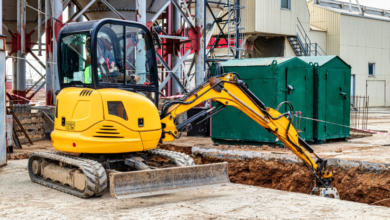Building a Healthier Workspace: How Small Habits Create Big Impact

Creating a healthier workspace is not just about having the right equipment—it’s also about developing daily habits that support your physical, mental, and emotional well-being. Many professionals today spend long hours at their desks, often forgetting that the environment around them can influence productivity, motivation, and overall health. Whether you work from home or in an office, your workspace plays a vital role in how effectively you perform your tasks each day.
In this article, we’ll explore how to build a healthier work routine by being more confident in your surroundings, staying proactive with your team and management, balancing focus with short breaks, and keeping your workspace organized. These simple practices can transform your daily experience and help you achieve your goals more efficiently.
Be Confident in Your Surroundings
A healthy workspace starts with confidence—confidence in where you work, how you work, and what you’re surrounded by. If your desk is cluttered or your environment is distracting, it can easily affect your ability to concentrate. On the other hand, a neat, well-lit, and motivating environment can boost your confidence and keep you focused on what matters.
Being confident in your surroundings also means taking control of what you can influence. For example, adjusting the lighting to reduce eye strain, keeping essential tools within reach, and creating a personal touch with plants or motivational notes can improve your mood. The more you feel in control of your workspace, the more confident you’ll be in completing your daily responsibilities.
Stay Proactive with Your Team and Management
A healthier workspace is not only about the physical setup but also about how you interact with the people around you. Being proactive with your team and management ensures smoother collaboration and a more positive work atmosphere.
When you actively communicate and anticipate the needs of your team, you reduce unnecessary stress and misunderstandings. This also shows professionalism and dedication. Instead of waiting to be told what to do, take initiative. Complete tasks ahead of deadlines, share updates regularly, and offer solutions when challenges arise.
Proactive communication doesn’t just make you a reliable team member—it also improves your confidence and sense of belonging in the workplace. When you align with your team and management, you feel more supported, which leads to a healthier and more productive work environment.
Balance Focus with Movement
One of the most common mistakes people make is sitting all day, focusing solely on work without giving the body and mind a chance to recharge. While dedication is important, sitting for long hours can harm your posture, circulation, and overall health. Research consistently shows that prolonged sitting increases the risk of fatigue, back pain, and even chronic conditions in the long run.
The solution is simple: balance your focused work time with movement. Even a one-minute walk around your office, a quick stretch, or standing up to refill your water bottle can make a big difference. These short breaks help reset your focus, relax your muscles, and keep your energy levels steady.
Some people invest in tools like an electric standing desk to alternate between sitting and standing throughout the day. While not essential, these adjustments can help prevent the negative effects of prolonged sitting and encourage better posture.
Hydrate and Refresh Yourself
It’s easy to get caught up in work and forget the basics—like drinking water. Hydration plays a crucial role in concentration, energy levels, and even mood. Dehydration, even mild, can lead to headaches, tiredness, and difficulty focusing.
Make it a habit to drink water regularly throughout the day. Instead of waiting until you feel thirsty, keep a water bottle at your desk and sip often. You can also use break times to refresh yourself—walk around, stretch, and drink water before diving back into work. These micro-breaks may seem small, but they can prevent burnout and help you perform better over time.
Read Also: OCD Therapy Effective Approaches and Techniques for Lasting Relief
Comfort Is Good, but Breaks Are Better
You might already have a comfortable chair, a large desk, and a well-arranged workspace. While these are important, they’re not enough on their own. No matter how ergonomic your chair is, sitting for hours without breaks is still harmful.
Giving yourself time to relax, stretch, or move around is essential. Think of these moments as an investment in your long-term productivity. A five-minute pause to step away from your computer can help you return with a clearer mind and renewed focus. Instead of pushing yourself to work non-stop, use short breaks strategically to maintain steady progress throughout the day.
The Power of an Organized Desk
Organization is often underestimated but has a direct impact on productivity. A cluttered desk can overwhelm your senses, cause distractions, and even waste time as you search for misplaced items. On the other hand, an organized desk creates mental clarity and helps you work more efficiently.
Start with the basics: keep only the items you need for your daily tasks within reach. Store unnecessary items in drawers, and regularly declutter papers or objects that pile up. You can also use organizers, shelves, or simple storage boxes to keep your workspace neat.
An organized desk also reduces stress. When everything has its place, you save energy and focus for what truly matters—your work. Over time, this habit becomes second nature, making your workspace both functional and inspiring.
Small Changes, Big Results
Improving your workspace doesn’t require massive changes or expensive tools. Often, it’s the small daily habits that make the biggest difference. Walking for a minute every hour, drinking water regularly, organizing your desk, and being proactive with your team may seem simple, but together, they build a healthier and more productive work routine.
Remember, your workspace reflects how you approach your work and your well-being. By being mindful of your environment and habits, you create a system that supports both your professional success and personal health.
Final Thoughts
A healthier workspace is more than just a comfortable chair or a wide desk—it’s about how you interact with your environment, your colleagues, and your own body. By being confident in your surroundings, proactive in communication, mindful about taking breaks, and committed to staying organized, you can transform the way you work each day.
The key is consistency. Small actions, when done regularly, lead to long-term benefits. Walk, hydrate, relax, and reset whenever needed. Treat your workspace not just as a place to complete tasks, but as an environment that supports your overall well-being. With the right balance of focus, movement, and organization, you’ll find yourself achieving your daily goals with more energy, clarity, and confidence.





